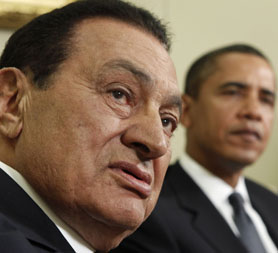Egypt revolt: pressure mounts on Obama
As tensions and stakes ratchet up in Egypt, the pressure is on President Obama to back calls for democratic reform. But can he do so? Our Washington Correspondent Sarah Smith reports.

President Obama has been conspicuous by his absence all weekend. Since a very carefully-worded statement that said as little as possible on Friday afternoon, we have not heard a word from the President about the momentous events in Egypt. In fact, we haven’t heard a word from him on anything – he’s staying out of sight just in case he gets asked about Egypt.
His spokesman put his head above the parapet on Monday evening to increase pressure slightly on Mubarak – but he said President Obama was not insisting Mubarak steps down.
White House spokesman Robert Gibbs said: “This is not about appointments, it’s about actions…Obviously there is more work to be done … The way Egypt looks and operates must change.”
But until it is more obvious what the outcome might be of this change – and until he knows who might take over if Mubarak is forced out – Obama doesn’t know what he wants to say. Not publicly anyway. The US is very conflicted over how it can promote democracy without losing a vital US ally.
This morning, Hillary Clinton is hosting a meeting of all 260 US ambassadors at the State Department. They were meant to be discussing all US foreign policy priorities for the whole year. But I think we know what one issue they will be talking about. Not surprisingly that meeting is closed to the media.
Clinton did appear on TV yesterday. She would not specifically say it was time for Mubarak to go, but when she talked about an “orderly transition” it was pretty clear that they don’t expect him to hang on.
Clinton…would not specifically say it was time for Mubarak to go, but when she talked about an “orderly transition” it was pretty clear that they don’t expect him to hang on.
She also refused to answer questions about whether the US would offer Mubarak sanctuary if he is forced to step down. Despite the fact that she has previously called him a “close family friend”.
We don’t expect to see Obama today, certainly not before Channel 4 News hits the air. So in order to put together a TV report looking at the US response to the events in Egypt we have to find some other footage – and looking through the archive in very instructive.
It’s not hard to find plenty of pictures of Hosni Mubarak with every US president since Ronald Reagan. All of them – Democrat and Republican – say they were always urging him to allow more democracy in his country. But looking at the smiles in all these photos it doesn’t look as though his refusal ever seriously upset the US.
The old library footage of the famous three-way handshake between US President Jimmy Carter, the Egyptian President Anwar Sadat and Israeli Prime Minister Menachem Begin outside the White House in March 1979 has to go in the piece.
Peace accord
Mubarak’s immediate predecessor Sadat secured Egypt’s place as America’s closest Arab ally in the Middle East when he signed a peace accord with Israel. Hosni Mubarak has honoured that deal for 30 years. But will whoever may take over now? That is America’s greatest fear.
We have also looked out the archive of President Obama’s famous speech in Cairo in June 2009, when he talked about America’s commitment to help democracy flourish everywhere.
He said then that all people have a right to speak their minds and have a say in how they governed. “America respects the right of all peaceful and law-abiding voices to be heard around the world, even if we disagree with them.”
He may not have realised Egyptians would take his words out on the street just 18 months later. Be careful what you wish for Mr President.
The White House did release some still pictures of Obama on the phone to other world leaders discussing the crisis over the weekend.
He spoke to David Cameron and to the Israeli PM. But the really tricky conversation will have been with other Arab leaders, like King Abdullah in Saudi Arabia. The White House said they talked about the need for democratic change in Egypt. The Saudis briefed that they talked about the looting and chaos in Cairo.
And that sums up the problem – a lot of US allies in the Middle East equate democracy with chaos. So how can the US subtly back democratic reform in Egypt without making other autocratic Arab leaders fear that the US will abandon them if these protests spread?
And whilst the US is telling them that to avoid uprisings in their own countries, they have to listen to their people more – get closer to the streets – they know that appealing to the people often means taking a much tougher anti-Israel, anti-US stance.
-
Latest news
-
Laughing Boy: New play tells the tragic tale of Connor Sparrowhawk5m

-
Sewage warning system allows some of worst test results to be left off rating system, analysis shows3m

-
Post Office inquiry: Former CEO didn’t like word “bugs” to refer to faulty IT system4m

-
Israeli soldier speaks out on war in Gaza12m

-
PM’s defence spending boost should be ‘celebrated’, says former Armed Forces Minister4m

-




